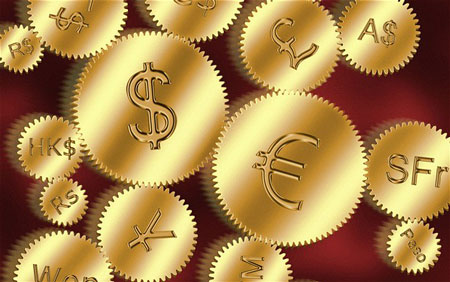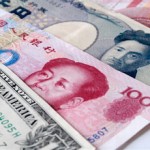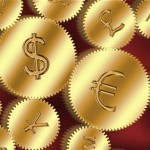Yen Climbs After Election; Aussie Near Low on Iron Prices

Australia’s dollar fell to the lowest since June 2010 and the nation’s bonds rallied as commodities slumped and people were taken hostage in a cafe in Sydney’s financial district.
The Aussie weakened against most of its 16 major peers after Treasurer Joe Hockey said yesterday the budget deficit is deepening because of the biggest slump in the nation’s terms of trade since records began more than 50 years ago. The yen pared gains after Prime Minister Shinzo Abe’s victory in elections he called to win a fresh mandate for policies that have driven Japan’s currency to a seven-year low.
“Once the news develops, this may help keep the Aussie under pressure,” Janu Chan, a Sydney-based economist at St. George Bank Ltd., said of hostages taken at Sydney’s Martin Place. “The news around the budget upset and the decline in commodity prices is weighing on the Aussie.”
The Aussie slid 0.1 percent to 82.41 U.S. cents as of 2:21 p.m. in Tokyo, after touching a four-year low of 82.04.
The yen advanced 0.1 percent to 118.66 per dollar, after strengthening as much as 0.8 percent. The greenback added 0.2 percent to $1.2442 per euro, after sliding 1.4 percent in the five days to Dec. 12. The 18-nation currency slipped 0.2 percent to 147.64 yen.
Cafe Hostages
A group of people has been taken hostage in a cafe in Sydney, where a black flag with Arabic writing was placed in a window, Australian television channels reported. Armed police cleared the square in the city’s central business district, as Prime Minister Tony Abbott convened Cabinet’s National Security Committee for briefings on the siege. Police said they were trying to make contact with hostages inside the Lindt cafe and urged people in the area to stay indoors and away from open windows.
Not all agreed that the hostage situation was the main driver for the Aussie.
“I have yet to know what exactly is happening, so for now, it’s hard to argue that it’s something moving the forex market directly,” said Junichi Ishikawa, an analyst at IG Markets in Tokyo.
Concerns that Australia’s mid-year economic and fiscal outlook today would show a wider budget deficit than initially projected weighed on the Aussie, said Stan Shamu, a markets strategist in Melbourne at IG Ltd. before the actual release.
Budget Deficit
Australia’s budget deficit for the year ending June 30 will widen to A$40.4 billion ($33.2 billion) from a May estimate of A$29.8 billion, Hockey said in a mid-year update today.
“Overall, there’s a lot of bearishness around that and commodities not looking like they are finding a bottom anytime soon,” Shamu said. “The Aussie hasn’t moved much at all since the hostage situation started; it’s probably just keeping traders a bit cautious.”
Australia’s three-year government bond yield dropped to 2.162 percent, the lowest since July 2012. The benchmark 10-year yield fell to 2.815 percent, also the lowest since July 2012.
Commodity currencies declined after West Texas Intermediate crude touched $57.34 a barrel in New York on Dec. 12, the lowest since May 2009, after trading at $107.73 six months ago. The International Energy Agency cut its forecast for global oil demand in 2015 for the fourth time in five months.
Norway’s krone was near an 11-year low and was at 7.3729 per dollar. It slumped 2.6 percent last week to 7.3511 and touched 7.3970, its weakest since September 2003. Norway is western Europe’s largest oil exporter.
Japan Election
The Japanese currency has tumbled about 30 percent in the past two years as Abe implemented fiscal spending and structural reforms and the Bank of Japan applied unprecedented monetary stimulus to battle deflation.
Abe’s ruling Liberal Democratic Party and its coalition partner gained more than two-thirds of the 475 seats in the lower house, winning about 325, the same as before yesterday’s election.
“In the medium-to-long term, there is no change in the trend for a weaker yen as Abenomics has won another four years for structural reforms and monetary and fiscal stimulus,” Yuji Saito, director of foreign exchange at Credit Agricole SA in Tokyo, by phone last night.
The Bloomberg Dollar Spot Index was little changed at 1,116.20. The measure, which closed Dec. 5 at a five-year high of 1,122.34, has gained this year amid speculation the Federal Reserve is moving toward raising interest rates as the world’s biggest economy improves.
U.S. central bank policy makers meet Dec. 16-17 after holding their benchmark interest-rate target in a range of zero to 0.25 percent since 2008 to support the economy.
Indonesia’s rupiah sank to the lowest level since the Asian financial crisis amid speculation local companies increased buying of dollars before the end of the year.
The currency slid 1.6 percent to 12,670 per dollar, heading for its lowest close since August 1998. That was the biggest drop since Aug. 1.
Source: Bloomberg – Yen Climbs After Election; Aussie Near Low on Iron Prices



























